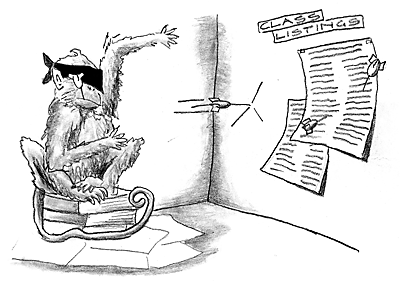


|
|
Making it count: How to pick the right classes
|
By Ryan Johnson
Arizona Daily Wildcat
Wednesday, June 8, 2005
Print this
 |
|
Illustration by Earl Larrabee
|
|
Welcome to Orientation, freshmen. You're no doubt getting your first taste of life away from home. Not bad, if a little scary, eh? In the very near future you'll be whisked away to the hideous Park Student Union, charged with the daunting task of choosing classes for the fall semester.
First, the bad news: There aren't many classes left. Budget cuts and the fact that everyone else registered months ago means you get the shaft. Anything with a remotely interesting title is gone. Sociology of Sexuality? You'd have to be an athlete. Not to mention entire departments restrict their listings partially or completely. No, you're going to be looking at such wonders as Elementary Persian and Introduction to Plant Pathology.
But the good news is that the title of the course is not how you should be picking courses anyway. Instead, the best strategy for academic happiness is picking the best professors.
What follows are ideas on how to look for good professors and how to choose them. Any names involved are just from random surveys of students. Professors aren't necessarily good if they're on this list and certainly aren't bad just because they aren't. It's just a random sampling that, who knows, may lead to one good class in the fall.
At the end of every class students fill out instructor evaluations. Associated Students of the University of Arizona (your new student government) maintains an excellent database of responses. Their website is www.asua.arizona.edu. It's probably the best way to get an idea of what a professor is like. Just pay attention to relative ratings because in general the ratings are inflated.
Try to avoid graduate students. Look at the instructor's name online and then search that department's website. International Political Economy (POL 360) is one of the most interesting classes when it's taught by Kathy Powers, but it's a bore under a Ph.D. candidate.
When there are multiple sections of the same class, it is an especially good time to exercise prudent instructor discrimination. For example, amongst Management Information Systems 111 (a pre-requisite for business that many freshman take) instructors, Kripa Krishnan made even his 8 a.m. section sing praises.
Good professors use innovative ways to involve the entire class. Roy Johnson uses experiments to get the point across in his Geological Perspectives class.
All else equal, smaller classes are better. But some of the best professors have large classes that are worth taking. Jerry Hogle makes his enormous course seem tiny.
Please please please don't take a class because it's easy. Don't take Philip Keller's chemistry class just because you have one of his old tests and heard he doesn't change them.
Avoid joke majors. The major culprit: communications. As one saleswoman at a furniture store told me, "a com degree isn't worth the paper it's printed on."
Contrary to what you may hear, there are good math professors. Find them. It's important to take math and other quantitative classes. It's a worthwhile challenge and employers respect that. Same goes for statistics. My pick? Patrick MacDonald for Management and Policy 276.
When asking others what was their favorite quality in their best professors, over and over I heard "passion." Some who were associated with that word: Salmon Shomade (Public Administration), Jeff Larson (Social Movements), Kathleen Schwartzman (Sociology of Latin America), Kevin Bonine (Conservation Biology), Jim Todd (Political Science), David Schmitz (Philosophy).
Another word: accessibility. Anne Padias (Organic Chemistry), Hanna Fares (Molecular and Cellular Biology).
Students who get bored easily in class will appreciate professors that can keep their attention. A few that people listed: Randy Accetta (Business Communications), the Hallick and Grimes team (Biology 181), Jesper Neilson (Marketing), Sam Ward (Molecular and Cellular Biology), Pat Willerton (Political Science), Del Phillips (Russian), Genie Reilly (Journalism), David Lomens (Math).
Look for professors that get students to read good things. Alan Malter has students read The Economist and focus on international issues. Freshman should especially consider International Studies 250 with Wayne Decker. Not only will students read The Economist, but they'll gain exposure to amazing non-fiction books.
Policy-oriented professors can be especially useful for students. Diza Sauers, for example, listens to students and believes they can influence policy.
Don't shy away from a class just because you don't think you'd be interested in the subject. Geta Lesseur will make the skeptical liven up to Africana Studies.
Registering for classes can be difficult and even depressing, especially for freshman, but by planning ahead and picking good professors, it can end up successfully. And think, in three years (hopefully), you'll get to register first.
Ryan Johnson is an economics and international studies senior. Although he deliberately left economics professors off the list to avoid offending his department, there are several good ones. Communications majors can send hate mail to letters@wildcat.arizona.edu.
Write a Letter to the Editor
|
|

|
